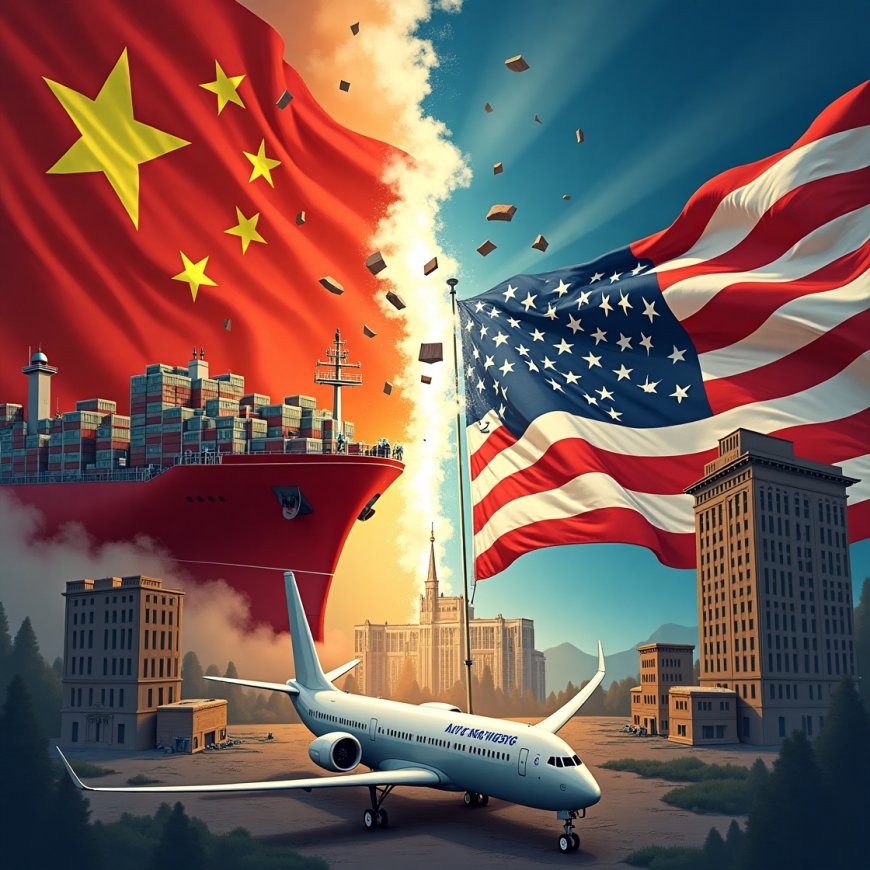China Shuts the Door on Hollywood and Boeing: Trade War Escalates
China bans Disney movies and Boeing planes amid rising trade tensions with the U.S. Explore the full impact of this escalation on the global economy.

Published: April 19, 2025 | Category: Global Economy
U.S.-China Trade War Reaches a Critical Point
The ongoing trade war between the United States and China has intensified dramatically. Former U.S. President Donald Trump confirmed that negotiations with Beijing are still in progress. However, sky-high tariffs remain in place—145% on Chinese imports and 125% on American goods—creating ripple effects across key sectors of the U.S. economy.
China Bans Hollywood Movies: Cultural Blow to the U.S.
One of the most significant retaliations came from China’s cultural sector. Chinese authorities have announced a ban on new Hollywood films entering the country. That includes movies from entertainment giants such as Disney, Marvel, and Warner Bros.
This is a major setback for the American entertainment industry. China has become one of the largest global markets for film, and without access, studios are expected to lose hundreds of millions in potential revenue. More importantly, this decision diminishes the cultural influence of the U.S. in one of the world’s most populous nations.
Boeing Grounded in China: Aerospace Industry Shaken
As part of its retaliation, China has suspended the purchase of Boeing aircraft. Boeing, one of the United States’ largest exporters and a pillar of the aerospace sector, is now blocked from one of its most critical international markets.
This decision is expected to have a substantial economic impact. China is a key player in the commercial aviation industry and was previously one of Boeing’s top clients. With this ban, the European rival Airbus may step in to fill the gap, further sidelining the American giant.
China Considers Halting U.S. Grain Imports
Even more troubling is Beijing’s consideration to stop purchasing American grain. This would directly affect the U.S. agricultural sector, especially in regions that are heavily reliant on exports of soy, corn, and wheat.
If implemented, this measure could lead to oversupply in the domestic market, pushing down prices and hurting thousands of American farmers. It also threatens to shift global trade routes as China looks to alternative suppliers in South America, Russia, or even Africa.
Chinese Sellers Flood Social Media With Cheap Goods
On Instagram and other platforms, videos have gone viral showing Chinese sellers offering ultra-cheap products directly to global consumers. From clothing and electronics to household items, sellers are aggressively clearing out inventory that can no longer be shipped to the United States due to the new tariffs.
This sudden influx of discounted goods not only disrupts local markets but also demonstrates China's capacity to pivot quickly and reach global audiences without relying on traditional trade infrastructure.
Global Consequences: A Trade War That Affects Everyone
This escalating economic conflict could fundamentally disrupt the global trade system. Analysts warn of widespread consequences, including:
- Disrupted supply chains worldwide
- Increased costs for manufacturing and shipping
- Shortages of consumer electronics and industrial parts
- Higher inflation in both developed and emerging economies
If the standoff continues, it may lead to a broader decoupling between Western and Eastern economic blocs, prompting nations to rethink trade alliances and global investment strategies.
Trump’s Trade Strategy: Pressure Over Concession
Former President Donald Trump emphasized that high tariffs remain a key strategic tool in negotiations. He justified the continued economic pressure as a means to protect American industries and jobs.
While supporters view this as a necessary stance against unfair practices, critics argue it has escalated tensions unnecessarily and inflicted collateral damage on U.S. businesses and consumers alike.
Market Response: Uncertainty Takes Hold
Financial markets have reacted sharply. Boeing shares dropped following the announcement, and Hollywood studios also experienced declines. Agricultural futures have become volatile as uncertainty looms over export prospects.
Meanwhile, e-commerce platforms are watching closely. The viral trend of direct-from-China retail could either become a short-term flash or evolve into a major disruption for Western retail businesses.
What’s Next? The Path Forward Remains Unclear
Without a resolution, these retaliatory measures could evolve into a full-scale economic standoff with no clear winner. The U.S. may seek new markets in Europe and Latin America, while China accelerates partnerships under initiatives like the Belt and Road.
For global observers, the key questions are whether diplomatic channels will open wider and whether the two superpowers can find common ground before deeper damage is done to the global economy.
Conclusion: A Crossroads for Global Trade
China's decision to block Hollywood films and Boeing airplanes, and to potentially ban American grain, marks a significant shift in the global trade balance. It signals a willingness to fight economic battles across multiple sectors, and a future where economic nationalism may take precedence over global cooperation.
As tensions continue, the world watches—and prepares—for a new era where the rules of trade, influence, and power are being rewritten in real time.
What's Your Reaction?
 Like
0
Like
0
 Dislike
0
Dislike
0
 Love
0
Love
0
 Funny
0
Funny
0
 Angry
0
Angry
0
 Sad
0
Sad
0
 Wow
0
Wow
0































